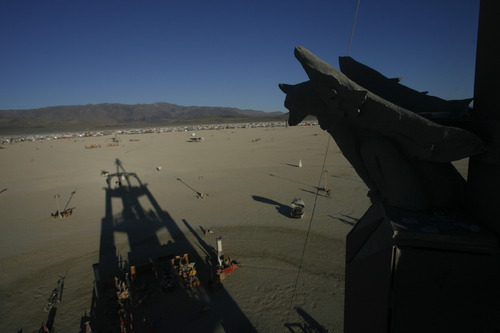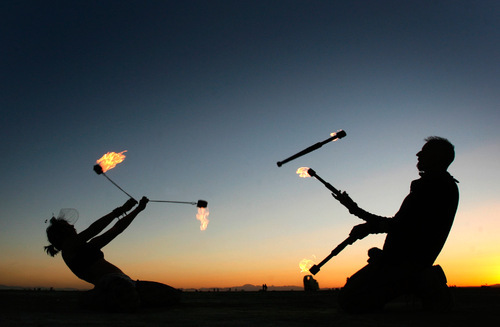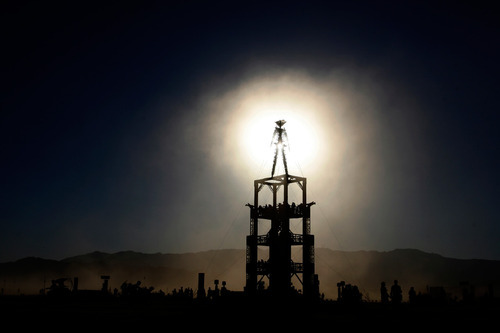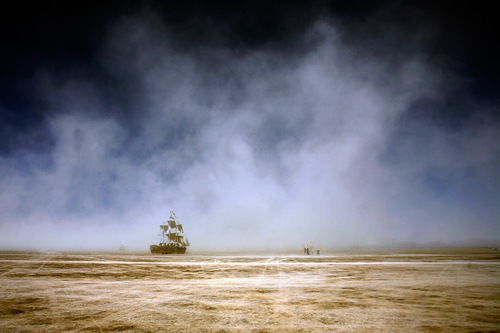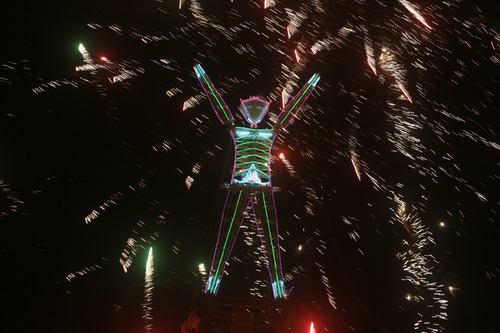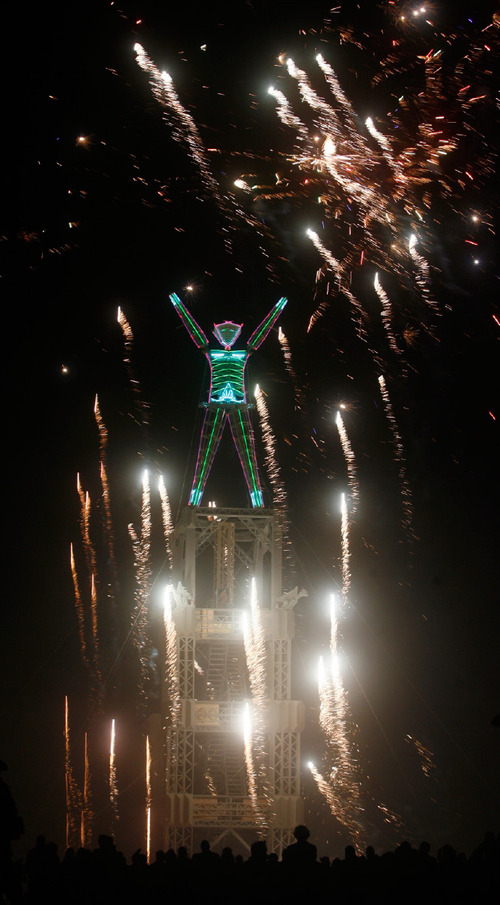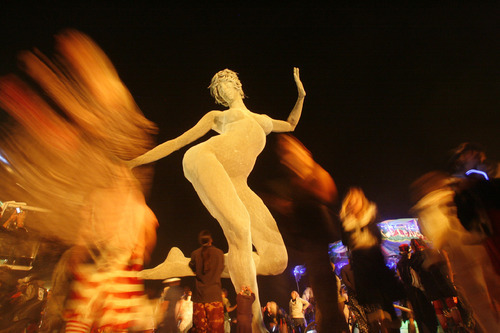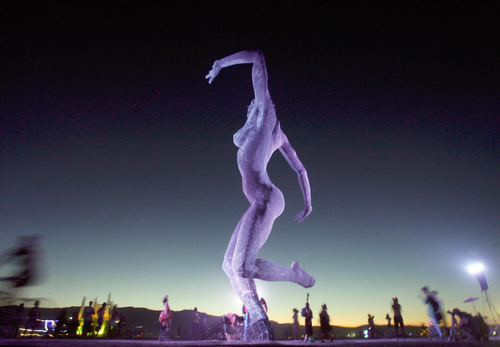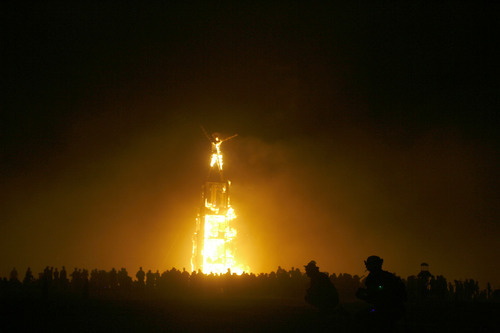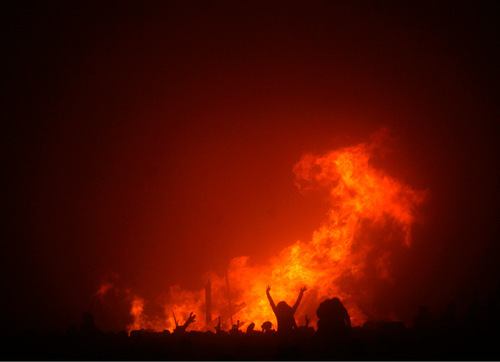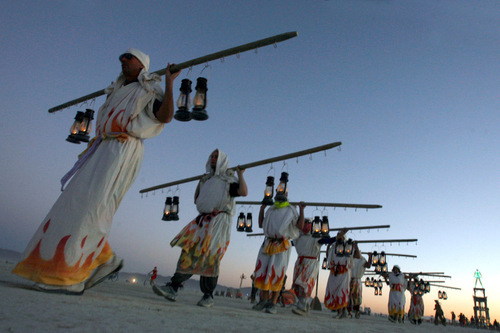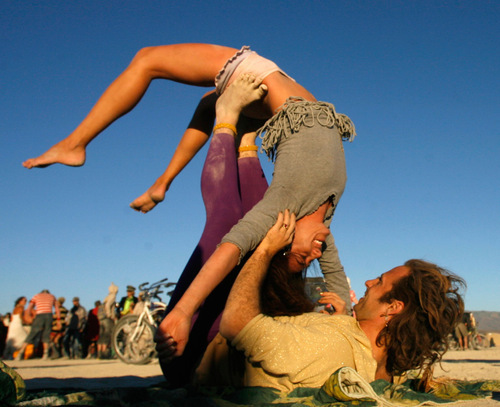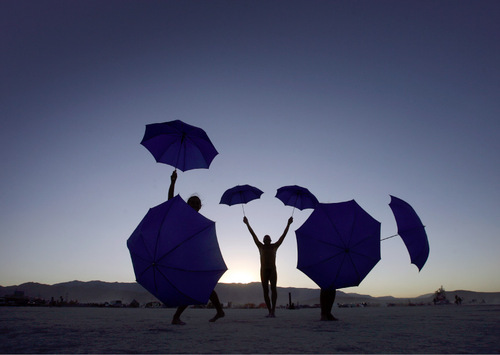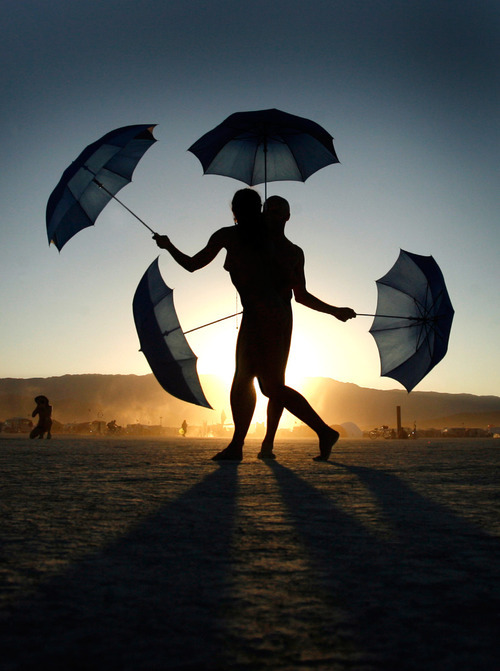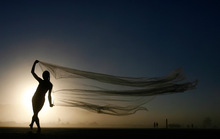This is an archived article that was published on sltrib.com in 2010, and information in the article may be outdated. It is provided only for personal research purposes and may not be reprinted.
Black Rock City, Nev.
It's Friday evening and the sky over the northern Nevada desert is clear and warm. Everyone in town has dressed for dinner.
Across the street from my van an elderly man is grilling tofu and a leek. Except for a military gas mask, he's stark naked. Next door to him, two women argue over "earth friendly" place settings. Both are fully clad in black trash bags and tinfoil lederhosen.
Mr. Gas Mask notices me watching and invites me over with a wave. I decline. Paul's a good neighbor but I'd sooner eat rat mucous than tofu. Also, I'm busy dressing for a night on the town — leopard print skirt, ripped blouse, army boots, and a hat shaped like a birthday cake.
Seconds later, a violent dust storm blasts through Black Rock City, tearing loose tarps, springing RV doors, tossing chairs and sandblasting eyeballs.
Welcome to Burning Man 2010. On a dry lake bed 100 miles north of Reno, roughly (and I do mean roughly) 50,000 people have come together to celebrate the spirit of free artistic expression — and to just get crazy.
I arrived Thursday morning and passed through security. A couple of guards searched my van for stowaways, tore my $240 ticket in two, and down the rabbit hole I went.
Black Rock City is laid out in a half moon pattern sprawled over several square miles, with streets named after the hands of a clock and alphabetized by the names of a city. The addresses sound a little strange but they work. If found, my group camped near Six O'clock and Istanbul.
What looked like a junkyard from the highway is actually a temporary city of every conceivable conveyance and portable abode. Up close, Black Rock City looks like a refugee camp in a post-apocalyptic world, only better organized.
Our group consisted of a dozen guys from "back east," several retirees, two cops, three guys from Liverpool, a pair of firefighters, and four people from Vegas. The gender split was about even.
Burning Man is not for the faint of heart or the overly prudish.
Public nudity is common, drugs and alcohol prevalent, and virtually every social convention is scoffed.
When I agreed to meet them in Black Rock City, friends Bangers and Mash cautioned me to expect to encounter "everything."
They were half right. In four days I saw things I'll probably never see again — motorized couches, giant tricycles, a school of people dressed like guppies, Zulus, rumba-dancing alligators, butt painting, a public bike ride by 5,000 topless women, monkey chanting, flame spewing metal dragons and vehicles reconfigured to resemble enormous insects.
By day three I had stopped noticing the nudity. If the human body is indeed as they say a work of art, not every human body was a masterpiece. Plenty of the human "art" on display was more along the lines of hastily scrawled graffiti.
As for drugs and alcohol, there were plenty of people who overdid themselves, but the ones I saw were being cared for by friends or even concerned strangers.
But here's what I didn't encounter at Burning Man. In four days, I didn't see a single fight or even a shoving match. No traffic accidents, no racial epithets, no bank robberies or even a snatched purse. I heard fewer sirens the entire time at Black Rock City than I hear in a day at home.
Someone in our group lost a favorite T-shirt while biking back to camp. Hours later, he retraced his route past hundreds of campsites, shouting, "Did anyone find my T-shirt?" After half an hour of this, someone ran up and returned it to him.
It would be easy to dismiss Burning Man as just a "freak show" if I hadn't bothered to notice the depth behind the irreverent face.
Miles through Black Rock City and out across the desert from our camp, beyond the giant wooden man we burned Saturday night, was "The Temple of Flux." We trekked out there one scorched morning.
The Temple, which is ritually burned on Sunday, was a collection of large wooden structures resembling sand dunes or wind-carved rock. When we arrived, it was already covered in mementos and messages from previous visitors. Scrawled on the walls were thoughts directed at loss and longing.
"Wish I'd been a better father."
"Why didn't you love me more?"
"To my dog Fleabag that is not forgot. F-king cars!"
"I swear that I will quit smoking."
"Where are you Samuel? Eight years now."
Photographs, tokens, flowers and other offerings were placed in nooks along the interior walls of the Temple. In a small clear space, I wrote a private message to my dead brother. A woman weeping nearby over some loss of her own patted me on the back.
When we left the Temple, some guy was nailing a wedding dress to the front of it. Bystanders speculated as to the reason. Had he been left at the altar? Was he recently divorced? Did his wife die?
I reflected on how easily we dismiss any form of reverence or worship that isn't consistent with our own. We should all resolve to do better by our fellow human beings. Burning Man helped remind me of that.
Riding back to camp under a blazing sun, I was temporarily stuck behind an overweight guy pedaling along in the nude. I resolved then and there to never borrow his bike.


